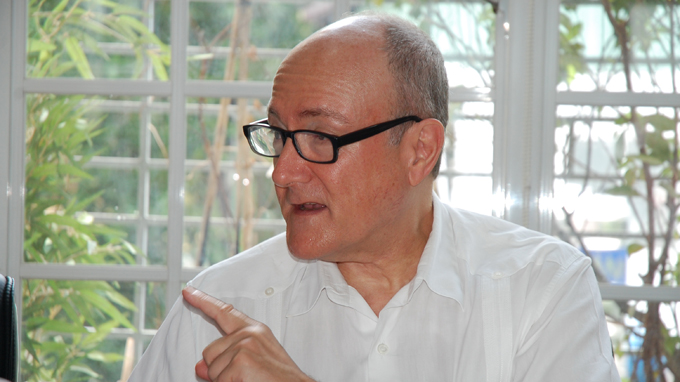History professor Larry Berman, author of a book on famed Vietnam intelligence officer Pham Xuan An, said on the September 4 launch of the translation of its revised edition that An is the best spy ever.
Berman, who wrote a book titled “Perfect spy X6 - the incredible double life of Pham Xuan An, Reuters, Time, New York Herald Tribune reporter & Vietnamese strategic intelligence general”, was present at the launch of the translated version of its revised edition on September 4, to mark An’s 86th birthday. An died in 2006.
“In my opinion, An is the best spy in the human intelligence world. He’s successful evidence of the human intelligence and even outperforms renowned spies in other countries. The Americans initially wanted to recruit An to train him as a spy, but after the war, CIA former head William Colby went to see him in Vietnam to learn from his rich intelligence experience,” Berman noted.
The Vietnamese version, translated by Do Hung and released by First News Co., is being published even before the revised English one is released in the US and several European countries.
An himself recounted his eventful, thrilling spy life to Prof. Berman, who recorded it and first wrote and published the book in 2007.
“I think An picked me to write his biography instead of another Vietnamese writer because he believed that as he and I hadn’t known each other before, I would be able to write his life story in the most accurate, objective and balanced way. But only after two years after our first meeting did An allow me to write about him,” the American professor shared.
Six years later, Berman made several significant additions to his publication, including several astoundingly intriguing facts and details on An’s life, which he recorded but didn’t include in his first edition.
The revised book also features several prized documentary photos, interviews by fellow journalists with An, and what his contemporary intelligence agents think about him.
The book also reveals a letter written by Thu Nhan, Major-general An’s widow, to Berman.
When asked why he devoted another six years to revising his book, Berman revealed that he owed a promise to An’s spirit. He had promised An that he would make known everything An had confided in him at different periods following his death, not all at once.
The American professor added that unlike his first edition, which was quickly translated, the translation of the second edition is considerably more detailed and faithful to the English version, and better reflects An’s personal and working life and style.
Regarding the mixed reactions a number of overseas Vietnamese people had towards Berman and his book on An, he said that he tried to overlook such pressure and reactions and focus single-mindedly on finishing the book.
“Many ‘attacked’ me quite hard when I went to California’s Orange County to give a presentation about the book. They were split in their reactions towards me and my book and were highly controversial on it. I did tell them that we were also responsible for the death of many Vietnamese people back then,” Berman recalled.
He added that he wants to read more material on An and write more about the legendary intelligence officer. He hopes that he will gain access to the confidential reports and analyses which An sent through Nguyen Thi Ba to his seniors, and in some 50 years’ time, young writers will hopefully follow his footsteps to recount more of An’s untold stories.
At the book launch, Berman also handed over the book’s copyright to First News, who will make a television series and a 120-minute movie titled “Diep vien hoan hao X6” (The perfect spy X6).
“I think if the films are made in Vietnam, An’s story would be depicted the fullest and most vividly,” noted Berman, adding that he would be willing to do the counseling, and several American veterans will also help with the making of the film.
Berman, who burned his draft to pay tribute to An’s spirit, said he wishes to be Vietnamese in his next life.
Prof. Berman, who is the founding dean of the Georgia State Honors College and has received the Bernath Lecture Prize, has written several books on the Vietnam War including “Planning a Tragedy: The Americanization of the War in Vietnam” (1982); “Lyndon Johnson's War: The Road To Stalemate in Vietnam” and “No Peace, No Honor: Nixon, Kissinger and Betrayal in Vietnam”.
|
Pham Xuan An (1927 – 2006) was a Vietnamese general with several nicknames, including: ‘X6’, ‘Hai Trung’ or ‘Tran Van Trung’. He worked in South Vietnam as a reporter for Reuters, TIME magazine and the New York Herald Tribune during the Vietnam War, while at the same time spying for North Vietnam, and contributed considerably to the ultimate defeat of the US and the Saigon regime (now Ho Chi Minh City). An lived this dangerous double life for more than twenty years. After the war, he was conferred with the title ‘Hero of the People's Army’ and promoted to general - one of the country’s only two intelligence officers to achieve that rank. His eventful spy life has inspired several locally and foreign produced books and documentaries, including Jean-Claude Pomonti’s “Un Vietnamien bien tranquille” (A tranquil Vietnamese) and Thomas A. Bass’s “Pham Xuan An's Dangerous Game”. |



















































